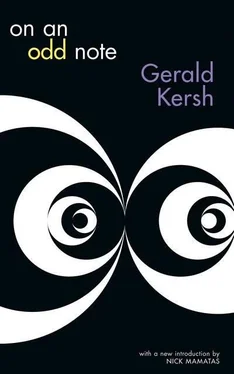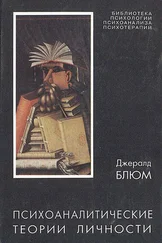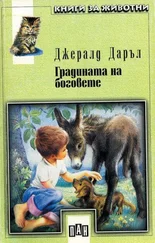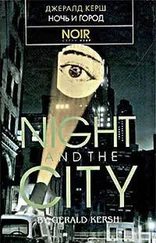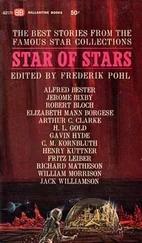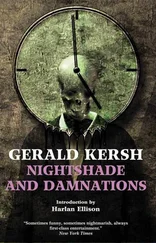William said, “Pay no attention, doc. John’s a man of nerves. Me, I take things easy.”
At this John cried, “Nerves! Damn you, William, you’ve torn mine to shreds!”
William said, quite placidly, “Give me some brandy, doctor.”
And then you would have been amazed to see the play of expression on the face of John, the plaintive one. He folded his hands and gripped them tight to stop the tremor; and I have never seen a more remarkable combination of desire and revulsion in a human countenance.
“Don’t!” he said; and then: “. . . Well, doctor, if you think it’s okay . . .”
Alas that I should say it—to an inquiring mind, however well-disposed, all men are guinea pigs. Besides, it might be argued, who was John to say what the suave and comfortable William might, or might not, have? Experimentally, if you like, I gave William three ounces of brandy in a measured glass. It went down like a thimbleful, and he smiled at me—a smile that was pleasant to see.
And believe me or believe me not, his brother John began to retch and hiccup and blink at me with eyes out of focus, while William, having lit a strong cigar, folded his hands on his stomach and puffed smoke!
Sympathy, what? Wow, but with a vengeance!
At last, after a fit of deep coughing, and something like nausea, brother John said, “You see, doctor? Do you see? This is what I have to put up with. William won’t let me work. Do you appreciate that? He won’t let me work!”
Both John and William were evidently men of substance. They had arrived in a custom-built Mercedes-Benz, were tailored by Stolz, and carried expensive jewelry. It is true that William was covered with cigar-ash, and that his platinum watch had stopped in the afternoon of the previous day; but it was impossible not to detect a certain air of financial independence.
John, the strawberry-faced, the tremulous one, he was neat as a pin, prim, dapper. I wish I knew the laundress who got up his linen. He wore a watchchain of gold and platinum and on the little finger of his left hand a gold ring set with a large diamond. There was about two carats of diamond, also, stuck in his black satin tie. . . .
How shall I describe to you this weird mixture of dandyism and unkemptness in John? It was as if someone had disturbed him in the middle of a careful toilet. His clothes were beautifully cut and carefully pressed. You might have seen your face in the mirrors of his shoes. But his hair needed trimming—it came up at the neck in little feathers—and his fingernails were not very tidy. William was flagrantly, cheerfully—I may even say atavistically—dirty, so as to be an offense to the eye and to the nostrils. Still, he too wore well-cut clothes, and jewelry: not diamonds; emeralds. Only rich men can afford to be so elegant or so slovenly.
So I asked, “Work, Mr. John? Come now, what do you mean by ‘work’?”
William, rosy and contented, was smiling and nodding in a half-sleep—the picture of health and well-being. And his brother John, who had not touched a drop, was in a state of that feverish animation which comes before the sodden sleep that leads to the black hangover.
He said, “Oh, I don’t need to work—I mean, not in point of economy. Mother left us enough, and much more than enough. Don’t you worry about your fee, doctor—”
“You leave Mother out of this,” said William. “Little rat. Always picking on Mother, poor old girl. Give us another bit of brandy, doctor; this is a bore.”
Before I could stop him William got hold of the bottle and swallowed a quarter of a pint. He was very strong in the hands, and I had to exert myself to take the bottle away from him. After I had locked it up, it was—believe me!—it was poor John who said, in a halting voice, “I think I am going to be sick.” What time William, blissfully chewing the nauseous stump of a dead cigar, was humming O Doña Clara , or some such trash.
And upon my soul, gentlemen, John joined in, in spite of himself, making what is politely called “harmony”:
O Doña Clara ,
Ich hab’ dich tanzen gesehn ,
Und deine Schoenheit
Hat mich toll gemacht . . .
Then John stopped, and began to cry.
He said, “That’s all he knows, you see? You see what he is? A pig, a vulgar beast. My tastes are purely classical. I adore Bach, I love Mozart, I worship Beethoven. William won’t let me play them. He breaks my records. I can’t stop him. He’s stronger in the hands than I am—exercised them more. Day and night he likes to bang hot jazz out of the piano; and he won’t let me think, he won’t let me work—doctor, he’s killing me! What am I to do?”
William lit another green cigar and said, “Ah, cut it out, will you? . . . Why, doc, the other day this one ordered in a record by a guy called Stravinsky, or something.” He chuckled. “It said on the label, Unbreakable . But I bust it over his head, didn’t I, Johnny? Me, I like something with a bit of life in it . . . rhythm. You know?”
John sobbed. “My hobby is painting miniatures on ivory. William won’t let me. He mixes up my paints—”
“Can’t stand the smell of ’em,” said William.
“—Jogs my arm and, if I protest, he hits me. When I want to play music, he wants to go to sleep. Oh, but if I want to sleep and he wants to make a noise, try and stop him!”
“Let’s have a little more brandy,” said William.
But I said to him, solemnly, “The stuff is deadly poison to you, Mr. William. I strongly urge that you spend about three months in my sanatorium.”
“I won’t go,” he said. “Nothing the matter with me. I’m okay.”
“Make him go, make him go!” his brother screamed. “Oh William, William, for God’s sake—for my sake—go to the sanatorium!”
“I’m okay,” said William, cheerfully. “You’re the one that needs the sanatorium. I’m not going. I’d rather stay at home and enjoy myself. A short life and a merry one. Ha?”
And the extraordinary fact of the matter was, William was, as he said, okay—liver impalpable, kidneys sound, heart in excellent condition—he, who drank two quarts of brandy every day of his life! A tongue like a baby’s, eyes like stars, steady as a rock. It was John who showed the stigmata of the alcoholic and the cigar-fiend—he who had never tasted liquor or tobacco.
How do you like that for sympathy?
John whispered brokenly, “I might have tried to bear it all; only last week this sot proposed marriage to our housekeeper! Marriage! To our housekeeper! I can’t bear it, I can’t bear it!”
William said, “Why not? Nice woman. Johnny hates her, doc, but she understands me. Past her prime, maybe, but comfortable to be with. Shares my tastes. Likes cheerful music. Don’t say no to a highball. Cooks the way I like it—plenty of pepper, rich stuff with a lot of spice. This Johnny-boy, here, all he can take is milk and boiled weakfish. Yes, so help me, I’m going to marry Clara. . . . Sure you can’t let me have another little bit of brandy, doc? An itsy-boo?”
I said, “No. For the last time, are you sure that you won’t come to my sanatorium?”
“Sure as you’re sitting there,” said William, while John sobbed helplessly on the sofa.
So, to conclude: The brothers John and William went out to where their great limousine was waiting in the dusk, and drove away.
Shortly afterward, John died in delirium of cirrhosis, nephritis, dropsy, and “the whole works”—as you put it. His brother William died soon after, and they were buried together in the Sacred Heart cemetery.
Curious, what?
The good Dr. Almuna rubbed his hands and chuckled.
Читать дальше
